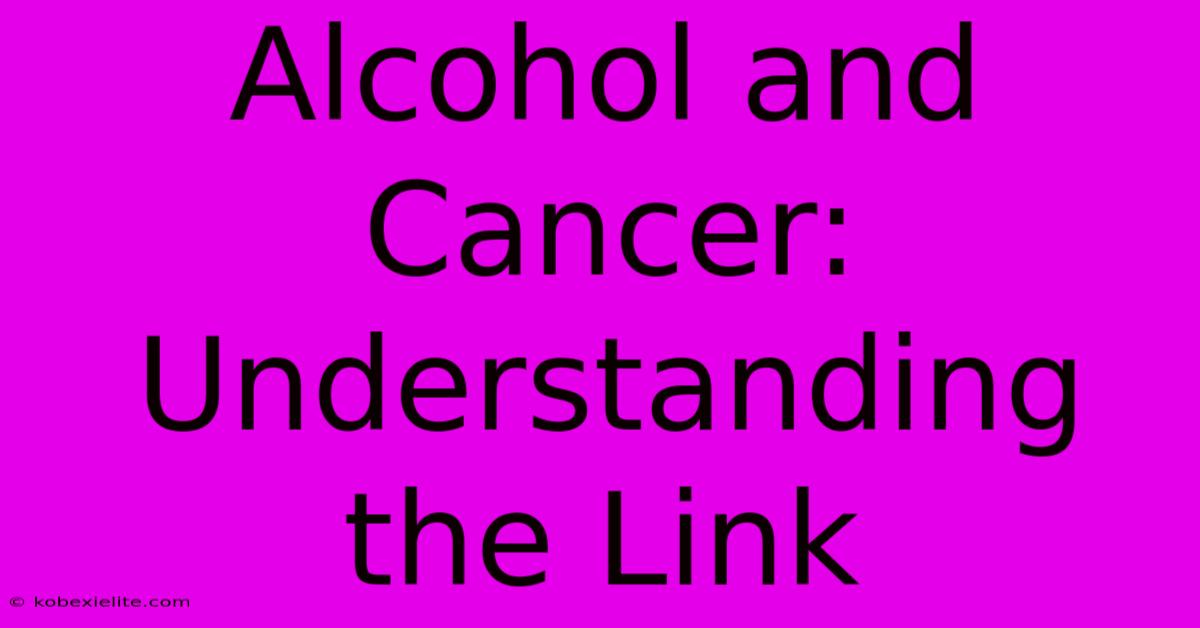Alcohol And Cancer: Understanding The Link

Discover more detailed and exciting information on our website. Click the link below to start your adventure: Visit Best Website mr.cleine.com. Don't miss out!
Table of Contents
Alcohol and Cancer: Understanding the Link
Alcohol consumption is a significant risk factor for several types of cancer. While moderate drinking might seem harmless, accumulating evidence strongly links even moderate alcohol intake to an increased risk of developing various cancers. Understanding this link is crucial for making informed decisions about your health.
How Does Alcohol Increase Cancer Risk?
The relationship between alcohol and cancer isn't fully understood, but several mechanisms are implicated:
1. Acetaldehyde: A Carcinogenic Metabolite
When your body processes alcohol, it produces acetaldehyde, a known carcinogen (cancer-causing agent). Acetaldehyde damages DNA, hindering the body's ability to repair genetic errors that can lead to cancerous cell growth. This damage accumulates over time, increasing cancer risk with prolonged alcohol exposure.
2. Nutritional Deficiencies
Heavy alcohol consumption often leads to nutritional deficiencies. Alcohol interferes with the absorption of essential vitamins and nutrients crucial for maintaining healthy cell function and preventing cancer. Deficiencies in folate, vitamin A, and vitamin B, for instance, are linked to increased cancer risk.
3. Immune System Suppression
Alcohol weakens the immune system, making the body less effective at identifying and eliminating cancerous cells. A compromised immune system allows pre-cancerous cells to proliferate and develop into tumors.
4. Hormonal Imbalances
Alcohol can disrupt hormonal balance, particularly in women. Changes in estrogen and other hormones are linked to an increased risk of hormone-related cancers such as breast cancer.
Cancers Linked to Alcohol Consumption
Alcohol consumption is associated with an increased risk of several cancers, including:
- Mouth and Throat Cancer: Alcohol's direct contact with the mouth and throat tissues contributes significantly to these cancers.
- Liver Cancer: The liver is the primary organ responsible for metabolizing alcohol. Chronic alcohol abuse leads to liver damage, increasing the risk of cirrhosis and eventually liver cancer.
- Breast Cancer: Even moderate alcohol consumption raises the risk of breast cancer in women, particularly post-menopausal women.
- Colorectal Cancer: Studies have shown a strong correlation between alcohol intake and colorectal cancer.
- Esophageal Cancer: Similar to mouth and throat cancer, the lining of the esophagus is directly exposed to alcohol, increasing cancer risk.
Reducing Your Risk: What You Can Do
The good news is that you can significantly reduce your cancer risk by limiting or eliminating alcohol consumption. Here are some key steps:
- Moderate your intake: If you choose to drink, do so in moderation. Guidelines vary by region, but generally, moderate drinking is defined as no more than one drink per day for women and up to two drinks per day for men.
- Consider abstinence: The safest option is to avoid alcohol altogether. This significantly reduces your risk of developing alcohol-related cancers.
- Maintain a healthy lifestyle: A healthy diet rich in fruits and vegetables, regular exercise, and maintaining a healthy weight can further reduce your overall cancer risk.
- Regular check-ups: Regular visits to your doctor for check-ups and screenings can help detect cancer early, when treatment is often more successful.
Conclusion: Informed Choices for a Healthier Life
The evidence clearly demonstrates a strong link between alcohol and cancer. Making informed choices about your alcohol consumption is vital for safeguarding your health. By understanding the risks and taking proactive steps to reduce your exposure, you can significantly lower your chances of developing alcohol-related cancers. Remember, while moderate drinking might be acceptable for some, abstinence is always the safest bet. Prioritizing your health through mindful choices is an investment in a longer, healthier life.

Thank you for visiting our website wich cover about Alcohol And Cancer: Understanding The Link. We hope the information provided has been useful to you. Feel free to contact us if you have any questions or need further assistance. See you next time and dont miss to bookmark.
Featured Posts
-
Bengals Wr Burton Left Behind In Pittsburgh
Jan 04, 2025
-
19th Century Castle French Island Listing
Jan 04, 2025
-
Fullerton Plane Crash Panicked Landing
Jan 04, 2025
-
Canada Ceo Compensation Report
Jan 04, 2025
-
Glasers Globes Plan Avoiding Koys Mistakes
Jan 04, 2025
